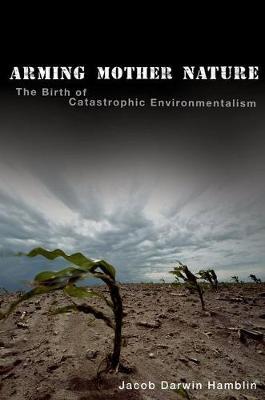Full Product Details
Author: Jacob Darwin Hamblin (Associate Professor of History, Associate Professor of History, Oregon State University)
Publisher: Oxford University Press Inc
Imprint: Oxford University Press Inc
Dimensions:
Width: 15.50cm
, Height: 2.30cm
, Length: 23.40cm
Weight: 0.440kg
ISBN: 9780190674151
ISBN 10: 0190674156
Pages: 320
Publication Date: 30 March 2017
Audience:
Professional and scholarly
,
Professional & Vocational
Format: Paperback
Publisher's Status: Active
Availability: Manufactured on demand

We will order this item for you from a manufactured on demand supplier.
Reviews
With this book Jacob Hamblin makes a major contribution to our understanding of the decisive role of military priorities and military funding in the shaping of a wide range of environmental sciences. As a contribution to the historiography of science as conditioned by its political, ideological, social, and financial contexts, Arming Mother Nature shows how the ideologies and international institutions of the Cold War shaped the rise of fundamental environmental sciences... A carefully crafted, powerfully articulated study of one of the most important dimensions of today's environmental policy debate... The book is a weighty example of the importance of environmental history research in relation to the public realm. Richard P. Tucker, Environmental History [A] fascinating and often disturbing history American Scientist In Arming Mother Nature, Jacob Hamblin offers a far-reaching and provocative account of just how dependent narratives of global climate change are upon the military support, apocalyptic scenarios, and political ideology that shaped the growth of the modern environmental sciences during the Cold War. Science Magazine [T]hought-provoking New Scientist This book advances the intriguing idea that 'catastrophic environmentalism' is not standard rhetoric warning the public about climate change and extinction of species, but a strategy developed by the Pentagon to fight the Cold War. Recommended. CHOICE A well-written and -documented challenge of some of the assumptions on both sides in the debate about global warming. Kirkus Reviews Jacob Hamblin's new book is a clearly and calmly told tale of the American effort to conscript nature -from the seafloor to the stratosphere -for potential active duty during the Cold War. Well researched in U.S. and European archives, it finds the roots of modern apocalyptic environmentalism in the hair-raising deeds and often hare-brained schemes of an American scientific-military complex under pressure to find ways to prevail against the USSR. It sheds new light on the old adage that is a miracle anyone survived the Cold War. J.R. McNeill, Georgetown University
Jacob Hamblin's new book is a clearly and calmly told tale of the American effort to conscript nature -from the seafloor to the stratosphere -for potential active duty during the Cold War. Well researched in U.S. and European archives, it finds the roots of modern apocalyptic environmentalism in the hair-raising deeds and often hare-brained schemes of an American scientific-military complex under pressure to find ways to prevail against the USSR. It sheds new light on the old adage that is a miracle anyone survived the Cold War. * J.R. McNeill, Georgetown University * A well-written and -documented challenge of some of the assumptions on both sides in the debate about global warming. * Kirkus Reviews * This book advances the intriguing idea that 'catastrophic environmentalism' is not standard rhetoric warning the public about climate change and extinction of species, but a strategy developed by the Pentagon to fight the Cold War. Recommended. * CHOICE * [T]hought-provoking * New Scientist * In Arming Mother Nature, Jacob Hamblin offers a far-reaching and provocative account of just how dependent narratives of global climate change are upon the military support, apocalyptic scenarios, and political ideology that shaped the growth of the modern environmental sciences during the Cold War. * Science Magazine * [A] fascinating and often disturbing history * American Scientist * With this book Jacob Hamblin makes a major contribution to our understanding of the decisive role of military priorities and military funding in the shaping of a wide range of environmental sciences. As a contribution to the historiography of science as conditioned by its political, ideological, social, and financial contexts, Arming Mother Nature shows how the ideologies and international institutions of the Cold War shaped the rise of fundamental environmental sciences.... A carefully crafted, powerfully articulated study of one of the most important dimensions of today's environmental policy debate.... The book is a weighty example of the importance of environmental history research in relation to the public realm. * Richard P. Tucker, Environmental History *
Author Information
Jacob Darwin Hamblin is Professor of History at Oregon State University. His books include Poison in the Well: Radioactive Waste in the Oceans at the Dawn of the Nuclear Age, Oceanographers and the Cold War, and Science in the Early Twentieth Century: An Encyclopedia.




